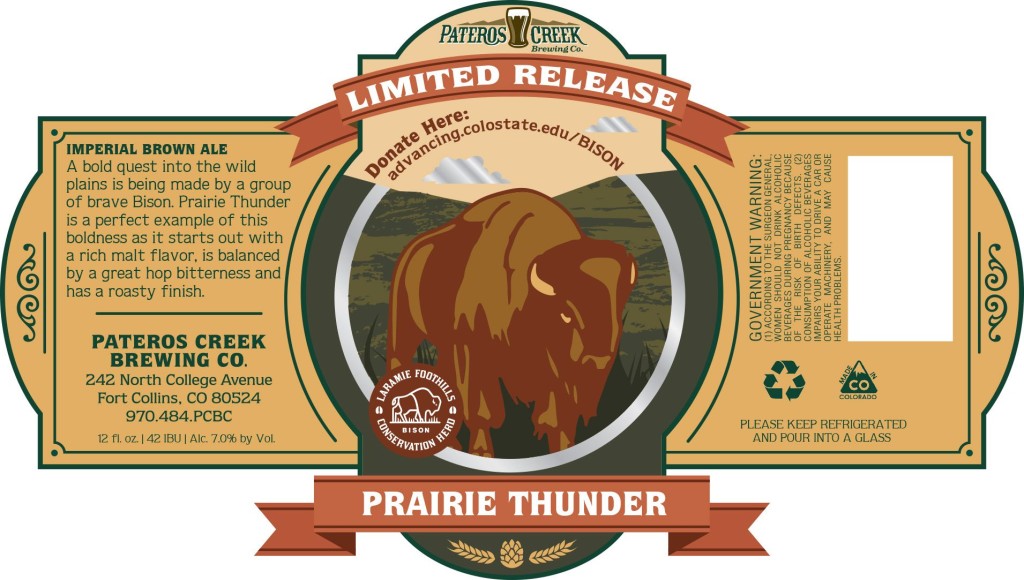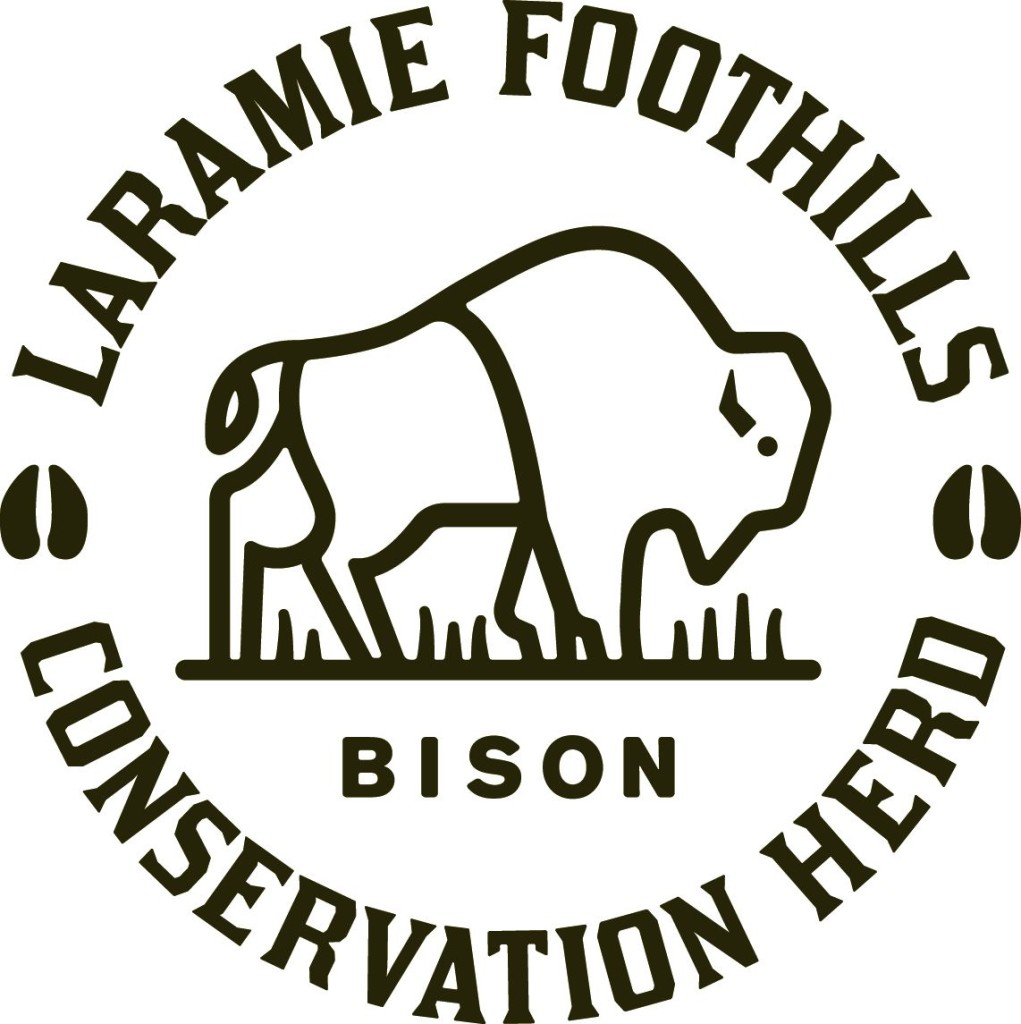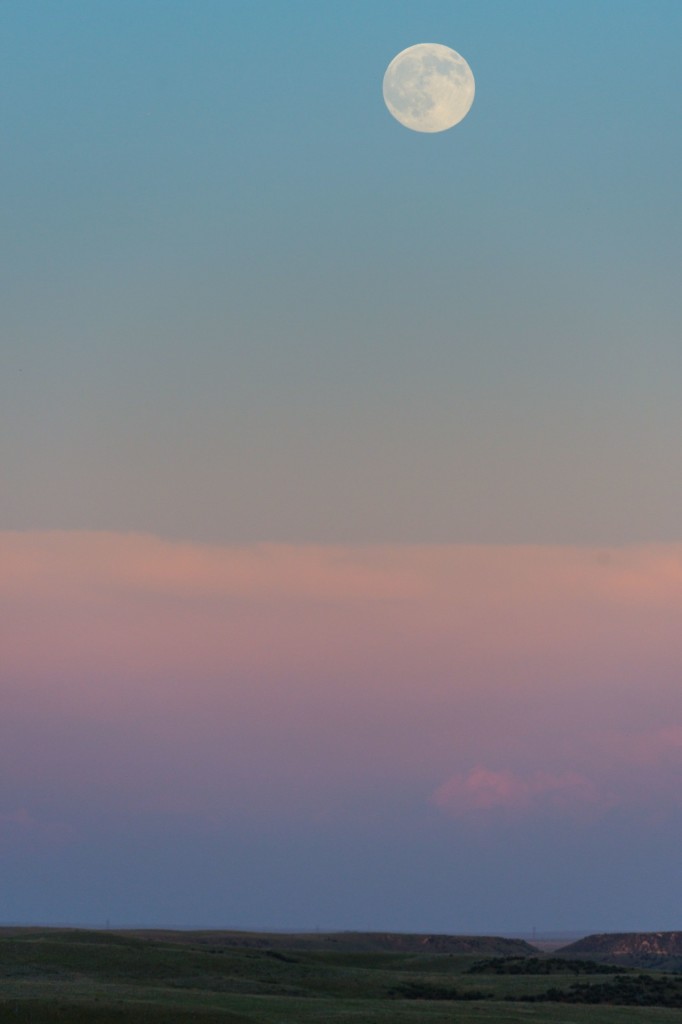Reproduction scientists, wildlife conservationists, land managers and Native Americans are readying for the return of American bison with distinctive Yellowstone bloodlines to northern Colorado’s shortgrass prairie on Nov. 1. And it wouldn’t be a notable event for the state’s craft brew capital without a commemorative microbrew.
Roll out the barrel: Pateros Creek Brewing Co. of Fort Collins is creating Prairie Thunder Imperial Brown Ale to mark the occasion.
The beer will celebrate – and raise money for – the Laramie Foothills Bison Conservation Herd, with a portion of proceeds supporting the project.
 The ale is set for official release at the brewer’s local tap room at 6:30 p.m. Monday, Oct. 26, when Jennifer Barfield, a reproduction scientist at Colorado State University, will discuss “Bison in your backyard: Preserving an icon in northern Colorado public spaces.”
The ale is set for official release at the brewer’s local tap room at 6:30 p.m. Monday, Oct. 26, when Jennifer Barfield, a reproduction scientist at Colorado State University, will discuss “Bison in your backyard: Preserving an icon in northern Colorado public spaces.”
Barfield works at Colorado State University’s Animal Reproduction and Biotechnology Laboratory and has contributed assisted reproductive technologies to enable reintroduction of Yellowstone bison on public land in northern Colorado.
Reintroduction set on National Bison Day
The Laramie Foothills Bison Conservation Herd, now housed at the CSU Foothills Campus, will be released Nov. 1 on about 1,000 fenced acres of native bison habitat at Soapstone Prairie Natural Area, managed by the City of Fort Collins Natural Areas, and Red Mountain Open Space, managed by Larimer County Natural Resources.
The herd of 10 American bison is directly related to those found in and around Yellowstone National Park – but without the infectious disease brucellosis that vexes the foundation herd. Brucellosis is a bacterial disease that infects cattle, elk and other animals, triggering abortion that can devastate herds; people also can be infected, with symptoms including severe intermittent fever.
The northern Colorado conservation project, a decade in the making, achieved both genetically valuable and disease-free bison with use of assisted reproductive technologies developed in part at CSU for purebred horses and cattle. These include artificial insemination, in vitro fertilization, embryo transfer and a special laboratory technique to wash reproductive cells and embryos.
Lead project partners are the CSU College of Veterinary Medicine and Biomedical Sciences, City of Fort Collins Natural Areas, Larimer County Natural Resources and U.S. Department of Agriculture – Animal and Plant Health Inspection Service.
Ecology project evaluates broad impacts
In another part of the bison project, researchers with the CSU Warner College of Natural Resources and Denver Zoo are evaluating impacts of bison grazing on the grassland ecology before and after reintroduction, and are comparing these ecological effects to cattle grazing in the area.
The ecology research also encompasses the response of community residents to bison conservation, seeking to fully capture the impact of American bison reintroduction on relationships among people, wildlife and the environment. Findings are expected to inform management of recreation and natural resources at the site.
Donate to bison through crowdfunding
 Early this year, the project received a One Health research grant of $80,000, contributed by colleges on the CSU campus and administered by the Office of the Vice President for Research. Funding for on-site project costs has been contributed by the city and county.
Early this year, the project received a One Health research grant of $80,000, contributed by colleges on the CSU campus and administered by the Office of the Vice President for Research. Funding for on-site project costs has been contributed by the city and county.
But that’s not enough to indefinitely support the Laramie Foothills Bison Conservation Herd, which eventually will expand to cover about 2,000 acres, twice the size of initial acreage. Project costs include:
- $120,000 for a holding corral, additional fencing and water infrastructure;
- $80,000 for a bison-handling facility at CSU; and
- Annual costs amounting to $170,000 for CSU laboratory supplies, graduate student education and research, and a veterinary intern.
Project partners this month launched a crowdfunding effort to raise $20,000 for a holding corral for the herd. It will allow managers to monitor bison health and to gather animals for treatment, if needed.
People interested in supporting it may visit the crowdfunding page to donate. Any amount, large or small, helps the bison effort, Barfield said.
Native American Cultural Center plans bison talk
As excitement mounts, the CSU Native American Cultural Center is joining plans to welcome American bison back to part of the creature’s historic range. The release date on National Bison Day is significant as the start of Native American Heritage Month, said Ty Smith, center director.

The center has invited several leaders from the Crow Nation, based in Montana, to offer a prayer as the Laramie Foothills Bison Conservation Herd steps onto its grassland home. Guests also will sing a traditional buffalo song.
After the release, the center plans a discussion about the importance of bison to Native American culture. The gathering will feature guest speaker Solomon Little Owl, a leader of Crow Nation business and veterans programs. Little Owl, former director of Native American Student Services at the University of Northern Colorado, has organized a number of cross-cultural experiences focused on bison in the Bighorn Mountains.
Little Owl will lead the bison discussion beginning at 6 p.m. Monday, Nov. 2, in the Lory Student Center Longs Peak Room. The gathering is open to the students and community.
Release activities full; bison viewing available later
The City of Fort Collins Natural Areas Department is organizing bison release activities at Soapstone Prairie Natural Area and Red Mountain Open Space. Personal vehicles will not be allowed on Nov. 1 because of parking limitations. Registration is full for buses transporting people from Fort Collins to the bison release.
However, Soapstone Prairie Natural Area and Red Mountain Open Space are open to the public through Nov. 30 and reopen for the spring and summer seasons on March 1. The bison may be viewed from Soapstone Prairie’s entrance road if they are in the vicinity. In addition, a newly rerouted trail, designed for hiking and mountain biking, leads visitors to viewing points for the bison pasture. Learn more on the City of Fort Collins’ website.